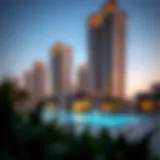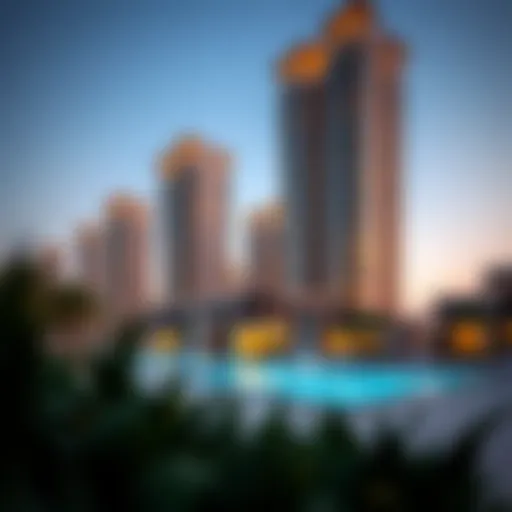Exploring Deira Souk: Dubai's Cultural Marketplace
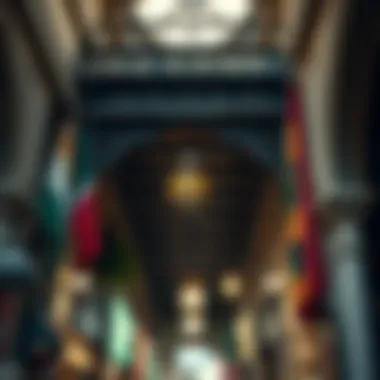

Intro
Deira Souk stands as a testament to the rich tapestry of Dubai's history and culture. Nestled amid the city's fast-paced modernity, this marketplace offers a glimpse into the past. When stepping into Deira Souk, you are not merely shopping; you are engaging in an experience steeped in tradition. The market is a blend of vibrant colors, distinctive scents, and sounds that reflect the charm and vibrancy of the local culture.
Visitors are greeted with an array of sights—from the gleaming gold shops to the fragrant spice stalls. Each shop feels like a portal to a different world, with merchants ready to share tales of their wares. This place is essential not just for the variety of goods it offers, but also as a cultural melting pot where expats and locals alike navigate the bustling aisles, sharing stories and experiences.
Within the confinements of this souk, you can witness how commerce thrives alongside cultural preservation. This article examines Deira Souk through various lenses—its historical background, the types of goods available, visitor experiences, and how it influences Dubai's economy. By understanding these facets, travelers and investors alike can glean insights into both the market's current state and its future trajectory.
The rich history behind Deira Souk paves the way for a myriad of economic opportunities that exist for those keen to invest in this dynamic area. For real estate agents, investors, and potential homeowners, the nexus between culture and commerce in Deira Souk may hold keys to strategic growth and development strategies.
Let’s delve into the heart of Deira Souk, examining its market trends, investment strategies, and what the future may hold for this beloved hub.
Prolusion to Deira Souk
Deira Souk stands as a pivotal landmark within the bustling heart of Dubai. This enchanting marketplace is where tradition marries modernity, creating a unique atmosphere rich in history and culture. For many who visit, it's not just a shopping hub; it’s an experience that encapsulates the spirit of Dubai. Exploring Deira Souk means walking through a portal that interweaves past and present, offering visitors a glimpse into the venerated practices that have shaped this vibrant city.
As you wander through the narrow alleys, the aroma of spices wafts through the air, creating an enticing sensory journey. Here, you can discover a mosaic of cultures, as merchants from various corners of the globe showcase their goods, each with its unique story. Understanding the significance of Deira Souk in today’s context allows us to appreciate how it serves as a vital economic and cultural hub in Dubai.
Historical Context
Deira Souk, one of the oldest marketplaces in Dubai, boasts a history dating back to the early 20th century. Originally established as a trading post, it quickly became a nucleus for commerce and cultural exchange. The souk was crucial during the pearl diving boom, when traders and merchants flocked to the region seeking fortune. This established Deira not only as a economic center but a melting pot for diverse cultures, laying the foundation for what Dubai represents today.
As the city evolved, so did the souk, transitioning from a local trading market into a tourist attraction without losing its authentic charm. Historic buildings and traditional architecture still stand as a testament to Dubai’s rich heritage. Walking through these storied streets, one can sense the whispers of the past, beckoning every visitor to take part in its ongoing narrative.
Significance in Modern Dubai
In the contemporary landscape of Dubai, Deira Souk retains its relevance amidst rapid urbanization and technological advancements. It is more than just a marketplace; it represents the city’s cultural identity, balancing modernization and tradition.
This souk plays a significant role in contributing to Dubai's economy, creating job opportunities for locals and fostering entrepreneurship among small businesses. The mix of products offered – from spices to textiles – highlights the city’s diverse consumer base, attracting residents and tourists alike. Each transaction, whether it's a simple spice purchase or a luxurious gold jewelry piece, fuels the local economy and preserves the artistry and craftsmanship unique to the area.
The bustling atmosphere of Deira Souk showcases a social fabric woven from both local and expatriate communities. Here, friendships form over shared experiences, while merchants exude hospitality, reinforcing a sense of belonging for all who visit. It’s a dynamic intersection of the rich cultural heritage of Dubai, and its undying spirit of commerce, making Deira Souk a lively example of how history and modernity can coalesce smoothly.
"Deira Souk not only embodies the rich heritage of Dubai, but also stands as a testament to the city's relentless spirit of growth and adaptation in a changing world."
As we continue to explore this marketplace throughout the article, we will delve deeper into the factors that shape its identity, remarkable vendors, and its place within the evolving narrative of Dubai.
Marketplace Dynamics
The dynamics of Deira Souk serve as a microcosm of Dubai's broader economic landscape. The bustling ambience of the souk represents the convergence of tradition and modernity, offering insight into the intricate relationship between cultural heritage and economic vitality. The marketplace is not merely a venue for buying and selling; it's a thriving ecosystem that supports local artisans and businesses while providing a sense of identity to the community.
A particularly significant element of Marketplace Dynamics is its role in fostering connections between buyers and sellers. This interaction breeds an atmosphere filled with stories shared over the exchange of goods, ensuring that every purchase holds a personal touch. Moreover, it is essential for enhancing the social fabric that ties the diverse populace of Dubai together, thus contributing to the area’s cultural richness.
Types of Goods Offered
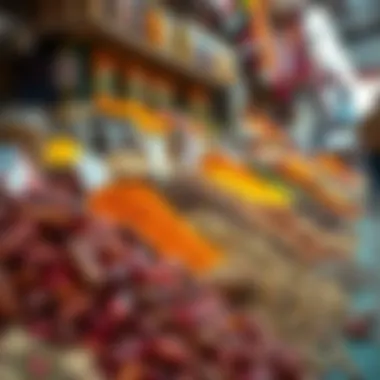

Spices and Herbs
In Deira Souk, spices and herbs hold a pivotal role in defining the sensory experience. The vivid hues and intoxicating aromas waft through the air, enticing passerby, and inviting exploration. Each vendor often boasts a unique blend of spices, telling their own history through the flavors they offer.
The key characteristic of spices is their ability to evoke both flavor and memory. For many expatriates and visitors alike, these spices serve as a culinary passport—transporting them back to their homes or stirring curiosity about new recipes. The unique feature of this section of the marketplace is the sheer variety available, from saffron to sumac, highlighting a connection to global cultures. One advantage is the opportunity to taste-test various blends, ensuring satisfaction before purchase. However, purchasing spices without background knowledge could lead to overwhelming choices, or, worse, subpar quality.
Textiles and Clothing
Textiles and clothing represent another vital aspect of Deira Souk's marketplace dynamics. From richly embroidered garments to breathtakingly intricate scarves, these goods reflect the artistry prominent in Middle Eastern culture. Local fabric vendors offer a combination of traditional attire and contemporary styles, appealing to a wide range of customers searching for something unique.
This realm is notable for its popular characteristic—the vibrant colors and intricate patterns that tell stories. Shoppers may find themselves drawn to clothing inspired by regional trends. A unique feature of the textiles here is the craftsmanship, as many items are hand-made by local artisans, ensuring quality and exclusivity. One advantage is the potential for finding one-of-a-kind items that cannot be replicated. However, a disadvantage could be the price for handmade goods, which sometimes may be higher than mass-produced alternatives.
Gold and Jewelry
In a city often associated with luxury, gold and jewelry stand tall as a vital component of Deira Souk. The gleam of gold captures attention immediately, while the artfully designed pieces reflect the rich history of trading in precious metals. This aspect of the souk attracts not only tourists but also serious jewelry enthusiasts.
The key characteristic of this category is the variety of styles—from traditional Middle Eastern designs to modern aesthetics. Dubai’s cultural background adds to the allure, as buyers often view purchasing gold as more than a financial investment. The unique feature here is the ability to engage in haggling, which can sometimes lead to a more personalized shopping experience. One advantage involves the competitive pricing of gold in this marketplace, but it’s vital to ensure the authenticity of the products because scams can occasionally lurk behind charming displays.
Traditional Crafts
Traditional crafts encapsulate the spirit and heritage of Dubai, and this section of Deira Souk is a haven for those who appreciate artistry. Ranging from intricate pottery to hand-woven baskets, these products are rich in cultural significance and storytelling. Often, artisans are on-site to showcase their craft, making for an engaging experience for onlookers.
The key characteristic is the authenticity of the goods, as each piece tells a tale of its origins. This adds a layer of depth that appeals greatly to visitors seeking more than just material items. The unique feature of traditional crafts is their connection to the local community, supporting craftsmanship that has been passed down through generations. While the advantage lies in owning a piece of cultural heritage, a disadvantage might be the pricing, as these products are often not as cheap as the more mass-produced alternatives.
Vendors and Their Stories
Stories are the lifeblood of the souk, and the vendors are its heart. Each merchant has a unique background, often filled with challenges and triumphs that have led them to their stalls. These narratives enrich the shopping experience, creating a relationship between the vendor and the customer that transcends a mere transaction.
For example, one vendor selling spices may recount the tale of how their family has supplied flavor to the city for generations, hailing from a small village. Another jewelry seller might describe their journey of craftsmanship, explaining each intricate design's significance to their culture. Such personal connections create a tapestry of human experience interwoven with commerce—reminding shoppers that Deira Souk is more than a market; it’s a living museum of Dubai’s past, present, and future.
Cultural Experience
Exploring Deira Souk is not just about the transactions that unfold; it’s a vibrant canvas of the cultural ethos of Dubai. Visitors find themselves immersed in a tapestry of traditions, aromas, and sounds that echo the city’s rich heritage. The cultural experience here is layered and multifaceted, making it a prime focus of this article. It's beneficial for travelers and locals alike, as it offers insights into the significant role the souk plays in the daily lives and identities of Dubai’s diverse population.
Interaction with Local Merchants
The heart and soul of Deira Souk are its vendors, the lifeblood of this bustling marketplace. Engaging with the local merchants offers visitors a glimpse into the narratives of their lives, each story interwoven with history and tradition. For instance, an elder vendor selling spices may share how his family has been in the spice trade for generations, each jar holding not just spices but the legacy of his ancestry. This personal touch transforms a simple purchase into an exchange of culture.
More than just transaction, these interactions reveal a wealth of knowledge. Whether it's learning about the best saffron or understanding the difference between safflower and turmeric, these merchants serve as cultural custodians. Engaging with them enhances the shopping experience and provides an opportunity to connect on a personal level, creating memories that linger long after leaving.
Culinary Explorations
Traditional Foods
Traditional foods at Deira Souk represent more than just meals; they embody the spirit of Dubai’s culinary heritage. Dishes such as Shawarma or Hummus elevate simple stalls into gastronomic pillars of the local culture. Each bite narrates a history, seasoned by the cultural influences that shaped Dubai. One specific characteristic of these foods is how they are often prepared using age-old techniques passed down through generations.
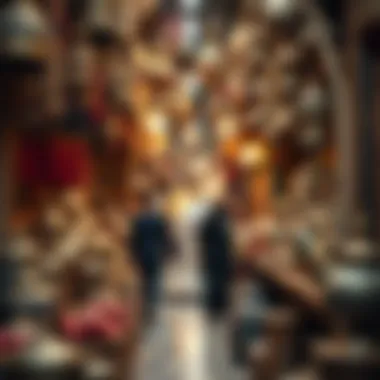

For instance, the technique of slow-roasting meat on vertical spits for Shawarma results in flavors that are both smoky and succulent, making it a popular choice for both locals and tourists alike. The accessibility of these traditional foods at various price points makes them a beneficial choice for those looking to experience Dubai’s culture from the ground up. However, one must also be cautious as not all food vendors maintain high standards; therefore, selecting trusted vendors can enhance one’s culinary journey at the souk.
Street Food Options
Street food options add a lively dimension to Deira Souk, reflecting the energy of the marketplace itself. Vendors showcasing tantalizing Falafel or Mandi create an inviting mosaic of colors and flavors that delights the senses. The key feature of street food here is its affordability without sacrificing taste. Most options are wallet-friendly, making it easy for visitors to indulge in a variety of offerings.
Moreover, street food provides a unique opportunity to taste local flavors in a casual setting. However, a visitor must navigate the array of choices wisely, as some options may be less hygienic. To enjoy the best experience, it is advisable to observe the crowd; a busy stall often indicates that the food is both popular and freshly made. Street food, while sometimes daunting, often delivers an authenticity that enhances the cultural fabric of Deira Souk, showcasing culinary traditions that thrive in the heart of Dubai.
Economic Impact of Deira Souk
The Deira Souk has a pivotal role in the financial framework of Dubai. It serves not only as a gathering place for trade but also as a reflection of the broader economic landscape of the city. Here, local businesses thrive amidst a backdrop of a rich cultural tapestry, which effectively fuels the local economy while attracting visitors from various corners of the globe. A closer look at the souk reveals how it intertwines commerce with tradition, paving a path for sustained economic viability.
Role in Dubai's Economy
The significance of Deira Souk on Dubai's economy can be viewed from multiple angles. First, its generation of revenue through retail sales is monumental. Locals and tourists converge here, driven by a desire for authentic experiences and quality goods. Merchants offer diverse products, including spices, textiles, and jewelry, contributing to substantial sales. This activity creates a vibrant economic pulse that enriches the entire locality.
Moreover, the souk forms a vital nexus for small and medium-sized enterprises (SMEs). These businesses bolster the local economy by stimulating growth and innovation. As entrepreneurs set up shop to capitalize on the foot traffic, they contribute to the economic diversity that characterizes Dubai. The souk therefore becomes a breeding ground for start-ups, adding richness to the marketplace and improving consumer choice.
Additionally, the souk serves as a cultural ambassador for Dubai. It portrays the city’s heritage, bringing in visitors not only drawn to shopping but also to soak in the traditional ambiance. This influx promotes related industries like hospitality, further cementing Deira Souk’s role in Dubai’s economic narrative.
Impact on Local Employment
As the heartbeat of commerce in Deira, the souk is significant for job creation. The bustling market has not only retained long-standing employment but has also seen an expansion of job opportunities in recent years. Temporary positions during peak seasons are quite common, providing extra income for many families.
Here’s how Deira Souk contributes to employment:
- Direct Jobs: From shop owners to specialized craftsmen, the souk employs a diverse range of individuals. These jobs often include roles that require specific skills, such as jewelry making and textile weaving.
- Indirect Jobs: The souk generates additional employment opportunities in ancillary services, including logistics, marketing, and even cleaning services, creating a ripple effect in the local job market.
- Cultural Preservation Roles: Many artisans engage in traditional crafts, ensuring that ancient skills are passed down through generations while providing a livelihood.
The local workforce sees an amazing blend of expatriates and locals participating in the marketplace's dynamics. This melting pot of talent often leads to better services and more innovation, furthering the Souk's contribution to Dubai’s economic machine.
"The pulse of a city can often be measured by its markets. Deira Souk is not just a place to shop; it is a living, breathing economic entity."
Visitor Insights
Understanding the insights of visitors to Deira Souk is crucial for a multitude of reasons, especially for those involved in real estate, investment, and overall economic activities in Dubai. The unique blend of cultural richness and the vibrant market atmosphere offers tremendous potential not just to shoppers, but also to stakeholders looking to capitalize on the area's economic significance. Visitors' feedback can highlight key trends, enabling various industries to anticipate consumer behaviors and adapt accordingly.
One major takeaway from visitor insights is the focus on sustainability. As global shifts toward eco-friendliness become more evident, potential clients and investors are looking to ensure their investments align with contemporary values.
Moreover, these insights can unveil various factors that contribute to the bustling atmosphere of the souk, like local cultural events or seasonal promotions. Recognizing what draws visitors can help stakeholders leverage this information effectively, enhancing the market's appeal.
Consequently, knowing what past visitors loved and what they found lacking provides invaluable information for improving experiences in Deira. This feedback loop is essential for maintaining the souk's relevance in a rapidly changing marketplace.
What to Expect
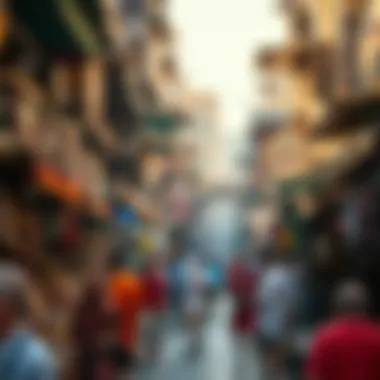

As you step into Deira Souk, be prepared for a sensory feast. The air is thick with the aroma of spices, and the lively chatter of merchants and shoppers creates an electric atmosphere. Visitors can expect to be greeted by the vibrant colors of textiles lining the stalls and the warm hospitality of local vendors eager to share their stories and products.
In essence, Deira Souk is an amalgamation of sights, sounds, and experiences tailored for every visitor. From the whispered tales of artisans to the bustling grit of the marketplace, every corner has something to offer.
Tips for Navigating the Souk
Navigating Deira Souk can be a delightful yet challenging adventure. Here are a few handy tips for making the most out of your visit:
Best Time to Visit
The best time to visit Deira Souk is early in the morning or late afternoon. During these hours, the weather is pleasantly warm, making it easier to explore without the harsh midday sun. The crowds are also less intense at these times, providing a more relaxed shopping experience. This can transform the hustle and bustle into a more enjoyable endeavor.
- Unique feature: Early birds may find fresh goods, particularly spices and textiles, as vendors are often replenishing their stocks.
- Advantages: A quieter atmosphere allows for better negotiation power with vendors, as they are more inclined to engage with you when they're not overwhelmed.
Payment Methods
Understanding payment methods available at Deira Souk is essential for a smooth shopping experience. Generally, cash is favored in this traditional marketplace. However, many vendors now accept cards due to the influx of international visitors. This blend of payment options caters to both local preferences and international expectations.
- Key characteristic: Cash transactions allow for easier bargaining, a key aspect of shopping in Deira. Vendors often expect customers to haggle, so having cash can facilitate that process.
- Unique feature: While credit cards are convenient, they may incur additional fees, and not all vendors are equipped to handle them, particularly small shops. Thus, it’s wise to have local currency handy.
Future Prospects
The trajectory of Deira Souk is indeed a noteworthy topic. Exploring its future prospects reveals potential changes that could enhance its relevance in a rapidly evolving city like Dubai. As urban environments adapt to modern demands, Deira Souk finds itself at a crossroads between preserving its rich heritage and embracing innovative developments. Understanding these possibilities is crucial for various stakeholders, including investors, real estate agents, and even the local government.
Potential Developments
When considering the potential developments around Deira Souk, one must think of several intertwining strands. For instance, there are discussions about creating more infrastructure that suits the needs of modern shoppers while also attracting tourists. This could include:
- Expanded Walkways: Improving pedestrian areas to enhance accessibility and comfort for visitors throughout the marketplace.
- Digitization Strategies: Implementing mobile apps that help shopkeepers manage inventories and allow buyers to browse products digitally. This fusion of craft and technology could be what keeps the souk lively in the 21st century.
- Café and Dining Expansion: More spaces dedicated to traditional and modern cuisine could appeal to a diverse crowd.
- Cultural Events: Hosting periodic cultural festivals could create more foot traffic and interest while educating visitors on both the local and regional heritage.
These developments not only promise growth for local merchants but can also sway real estate investments and development around the region. An attractive marketplace remains a pillar for community confidence and urban enchantment.
Sustainability Initiatives
The dialogue around Deira Souk's future would be incomplete without mentioning sustainability initiatives. In today’s world, sustainable practices are becoming a necessity rather than a luxury. Here’s how Deira Souk is considering this essential aspect:
- Eco-Friendly Products: Encouraging vendors to stock and promote sustainable goods can not only meet a growing consumer demand but can also represent a shift towards a greener marketplace.
- Waste Management Protocols: Plans for improved waste disposal and recycling programs would signal a commitment to ecological responsibilities. This would foster goodwill among consumers increasingly concerned about their environmental impact.
- Water Conservation Systems: Implementing systems to reduce water waste during cleaning and maintenance of common areas can set the souk apart as a leader in sustainability efforts within Dubai.
“Integrating sustainability isn’t just good for the planet, it can be a compelling selling point for Deira Souk to remain relevant in a global marketplace.”
Culmination
As we reach the end of our exploration, it's essential to reflect on the multifaceted role Deira Souk plays within Dubai's dynamic landscape. This marketplace is not merely a collection of stalls and shops; it's a living tapestry interwoven with the threads of culture, history, and economic vitality. It serves as a crucial social and economic hub, where tradition meets the modern world, allowing visitors and locals alike to engage in vibrant transactions that shape both personal experiences and broader economic narratives.
Summary of Key Insights
In summary, Deira Souk is a treasure trove filled with unique offerings and rich cultural significance. Here are the key insights gleaned from our journey through this bustling marketplace:
- Historical Significance: Deira Souk stands as a testament to Dubai's heritage, reflecting its evolution from a modest trading post to a global economic powerhouse. The history embedded in its walls provides context for its modern hustle and bustle.
- Diverse Goods: The souk is renowned for its variety, ranging from fragrant spices and luxurious textiles to exquisite gold jewelry. Each item tells a story, representing craftsmanship that has been passed down through generations.
- Cultural Interactions: The personal connections forged between merchants and visitors add a unique layer to the shopping experience. These interactions often lead to insightful exchanges about Dubai's culture and traditions.
- Economic Impact: By contributing to Dubai's economy through job creation and attracting tourism, Deira Souk highlights the importance of local commerce within a larger economic framework. It plays a pivotal role in sustaining livelihoods for many.
- Visitor Experience: Navigating the souk can be an adventure in itself, offering a sensory feast that includes the mingling of aromas, the vibrant colors of textiles, and the sounds of lively bargaining, making it an unmissable experience for any traveler.
- Future Sustainability: Considering the evolving landscape of Dubai, ongoing sustainability initiatives indicate a commitment to preserving the soul of the souk while adapting to modern needs, ensuring its relevance for future generations.
Deira Souk encapsulates much more than mere commercial activity; it embodies the spirit of Dubai's past and present, illustrating the city’s journey from tradition to innovation. For real estate agents, investors, expatriates, and developers, understanding the dynamics of this space provides crucial context for the economic vibrancy of Dubai. As you consider your next steps in this ever-evolving market, let the insights gleaned from Deira Souk guide your decisions with a balanced view of heritage and growth.
